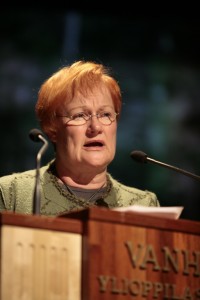 Tarja Halonen served as the first female president of Finland between 2000 and 2012. She previously was the chair of Seta, a prominent Finnish LGBT rights organization.
Tarja Halonen served as the first female president of Finland between 2000 and 2012. She previously was the chair of Seta, a prominent Finnish LGBT rights organization.
Harvard Political Review: Throughout your career, you have continually emphasized the role of human rights and social justice, particularly in the field of LGBT rights reform. Where do you think the next step is for LGBT rights in the United States?
Tarja Halonen: I started [my involvement with LGBT rights reform] when I was a student in politics in the 1960s. At the time, the world was not as free as you might think—not all hippies and flowers: society was quite conservative. We noticed that one of the big issues in the mental health realm was sexual identity rights and reproductive rights. And that’s why we—I was working with a student organization at the time—asked to get special funding for student organizations to provide related health services. Our actions occurred at the same time as a wider public discussion about these issues. In the early 1970s, Finland reformed the penal code so that being gay was no longer forbidden.
When I was the Minister of Social Welfare and Health, we noticed that there still existed a [problematic] diagnosis: though sexual minorities were no longer considered ‘criminal,’ they were considered to be ‘sick.’ We tried to avoid that kind of terminology. In 2000, a new liberation movement started, and as president of the country, I supported these NGOs in the same way I did forty years ago, but we didn’t have a perfect result.
I think that America’s [current LGBT developments] have been encouraging others in many countries. And I think that Nordic countries, the Netherlands and the United States have been some of the best examples [of LGBT rights]. Our governments understand that being gay is of course not a risk for the [LGBT] persons themselves, or for the community or the state. It’s a very important human rights issue—perhaps one of the most intimate issues of your personality. That’s why I think we have to work hard in order to help people in Uganda, the Middle East and Russia, because they have a new type of phobia concerning sexual minorities.
HPR: Do you have any advice for LGBT activists here on campus?
TH: Be proud. I think [being proud] is very good. One thing that I will say to [LGBT youth] is that everybody will love and respect you if you come out publicly … but also remember that this is your own personal life, you only need to tell as much as you want. Every human being has the right to be visibly what he or she is, but to keep their privacy if they want.
HPR: When you were elected as Finland’s first female president in 2000, you joined a small, but growing number of female heads of state worldwide. In your opinion, how did gender affect your presidency?
TH: The media treats women and men differently. Many times, I found myself answering questions like, “How can you be so active in politics?” To which I answered that I had been [active in politics] for 25 years already. They asked: “How can you be here? Are you neglecting your family?” I answered that my children are grown-up and my husband is even more of a grown-up, so I don’t think I neglect them. Then they asked: “Is there anything you cannot do now when you are campaigning to become president?” I tried to be funny, and I said, “Perhaps I have no time for knitting the socks.” But once [that comment] hit the newspapers, we start[ed] receiving hundreds of knitting socks with notes saying, “That cannot stop you from becoming president.”
Of course, it was a joke, but in our campaign office, we put up a red scarf. Everyone in the office could come and knit the scarf for a while—men knitted it too. Sure, some were better at knitting and some were worse, but the act of knitting together symbolized equal treatment.
HPR: What would you like to do with the remainder of your political career?
TH: I would like to answer that question by giving some advice to the audience. Please, be active in politics, but be interested in issues, not in your own political career. You can be a politician, but if you’re more committed to the issues, you won’t be disappointed if you don’t win this or that election. Instead, you’ll have splendid possibilities in hundreds of places concerning those same issues. And the issues are important. You, yourself are important.
My second point is that you can support items that are not popular, such as sexual minority rights, human rights, immigrant rights, or gypsies’ rights, and still you can become popular yourself. [Your supporters] know, you are not calculating your career—you are making the world a little bit better.
This interview has been edited and condensed for clarity.
Image credit: Flickr user “megapolis”